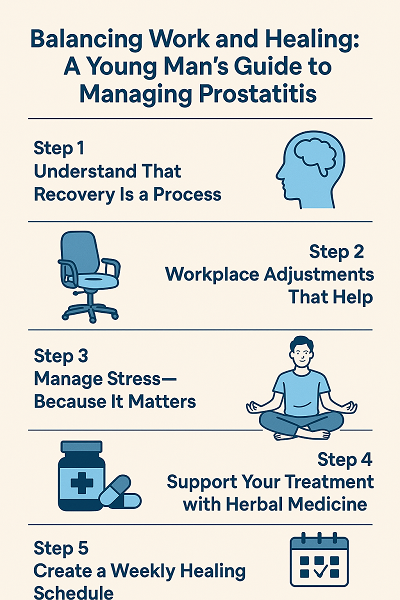Chronic Prostatitis in Your 30s or 40s? Here's How to Balance Treatment and Work
For many young men, a diagnosis of chronic prostatitis can feel like hitting an unexpected speed bump in life. The symptoms—frequent urination, pelvic discomfort, fatigue, sexual dysfunction—can be draining. Yet, career responsibilities, long office hours, and social obligations don't stop.

So how can you effectively manage prostatitis without compromising your work performance or long-term health?
Here's a practical guide to maintaining your career momentum while giving your body the support it needs to heal.
Step 1: Understand That Recovery Is a Process
Chronic prostatitis, especially chronic pelvic pain syndrome (CPPS), is not a quick-fix condition. It typically involves fluctuating symptoms, often triggered by stress, long sitting hours, lack of sleep, and irregular lifestyle habits.
The goal of treatment isn't just about eliminating pain—it's about managing your overall lifestyle to reduce flare-ups and support your body's healing mechanisms.
Step 2: Workplace Adjustments That Help
Ergonomic Seating
Sitting for extended hours compresses the prostate and pelvic floor muscles. This can worsen inflammation and pain. Here's how to sit smarter:
- Use a donut cushion or memory foam seat pad
- Sit upright with knees slightly higher than hips
- Take standing or walking breaks every 30–45 minutes
Stay Hydrated (But Strategically)
Hydration is important to flush out urinary irritants—but don't overdo it during meetings or long commutes. Space out your water intake to avoid urgency when you can't get to a restroom.
Mind Your Diet at Work
Avoid triggering foods such as:
- Caffeine (coffee, energy drinks)
- Spicy or greasy lunches
- Alcohol during after-work gatherings
Pack a prostate-friendly lunch rich in omega-3s, vegetables, whole grains, and anti-inflammatory fruits like blueberries.
Step 3: Manage Stress—Because It Matters
Work stress is one of the top flare-up triggers for prostatitis. Incorporating small stress-reducing habits into your day can reduce pelvic tension and symptom recurrence.
At work:
- Practice deep breathing between tasks
- Use noise-cancelling headphones to reduce sensory fatigue
- Avoid multitasking; tackle one project at a time
After work:
- Dedicate 20 minutes to light exercise, like walking or stretching
- Disconnect from screens an hour before bed
- Get 7–8 hours of consistent sleep
Step 4: Support Your Treatment with Herbal Medicine
Many young men prefer to avoid long-term antibiotic use due to side effects or lack of results—especially when prostatitis is nonbacterial.
This is where natural herbal solutions like the Diuretic and Anti-inflammatory Pill can make a difference.
Formulated based on traditional Chinese medicine principles, this all-natural remedy works by:
- Reducing chronic inflammation in the prostate
- Promoting smooth urination and relieving urgency
- Improving local blood circulation to speed up healing
- Easing pain in the pelvic floor region
Patients with a busy lifestyle appreciate that this treatment doesn't disrupt their routine—just take it consistently, no hospital visits required.
Step 5: Create a Weekly Healing Schedule
Staying organized can help you stick to treatment without letting it overwhelm you.
Example Weekly Plan:
| Day | Morning | Midday | Evening |
| Mon–Fri | 5-min breathwork | 10-min stretch, light lunch | Warm bath, limit screen time |
| Saturday | Yoga / walk | Rest / low-stress activities | Date night or relaxation |
| Sunday | Grocery prep (anti-inflammatory foods) | Journaling or therapy session | Early bedtime |
Even simple routines can have powerful cumulative effects.
What to Avoid If You Want Faster Recovery
- Over-exercising or lifting heavy weights
- Holding in urine
- Frequent sexual activity without rest days
- Self-medicating with antibiotics or painkillers long-term
- Ignoring symptoms until they escalate
Being proactive early means fewer long-term complications and a faster return to full energy.
Final Words
Being diagnosed with chronic prostatitis doesn't mean you have to choose between your career and your health. With the right adjustments, natural treatment support like the Diuretic and Anti-inflammatory Pill, and a clear daily structure, you can thrive professionally while steadily healing.
Your health is a long-term asset—investing in it now pays off later, both in work and in life.



